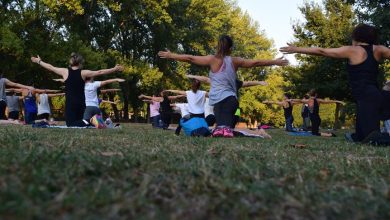Discover the Optimal Time to Run

Are you skeptical about whether the time you choose to run really makes a difference? Well, let us put your doubts to rest. In this article, we will delve into the advantages of running in the morning, at lunchtime or early afternoon, and in the evening. By analyzing the benefits of each time slot, you can determine the optimal time to fit your goals and lifestyle. So get ready to optimize your running routine and take your fitness journey to new heights.
Key Takeaways
- The best time to run depends on individual goals and preferences.
- Morning runs provide an energy boost, improve concentration, and have benefits for blood pressure, sleep patterns, and metabolism.
- Lunchtime or early afternoon runs can break up the day, be ideal for high-intensity workouts, and help with cognitive fatigue after lunch.
- Evening runs can help unwind, relieve stress, aid in proper warm-up and stretching, and can be beneficial for sleep if done at least 2 hours before bedtime.
The Benefits of Morning Runs
Start your day off right with the energizing benefits of a morning run. When it comes to weight loss, running in the morning may be more beneficial than running in the evening. This is because morning runs help to boost metabolism, leading to increased calorie burning throughout the day. Additionally, running in the morning can improve muscle recovery. By exercising early, the body has more time to repair and rebuild muscles throughout the day. On the other hand, running in the evening can be beneficial for stress relief and winding down after a long day. It also allows for a proper warm-up and stretching routine. Ultimately, the best time to run depends on individual goals and preferences. Consider factors such as weight loss goals, muscle recovery needs, and personal schedules when deciding when to lace up your running shoes.
The Advantages of Lunchtime or Early Afternoon Runs
Make the most of your day by fitting in a quick run during lunchtime or the early afternoon. Running during this time can have several advantages, including the impact it has on productivity and its relationship with digestion.
| Advantages of Lunchtime or Early Afternoon Runs |
|---|
| 1. Boosts Productivity: Taking a break from work to go for a run can actually enhance your productivity. Exercise increases blood flow to the brain, improving focus, concentration, and overall cognitive function. |
| 2. Clears Cognitive Fatigue: Moderate exercise after lunch can help combat the post-lunch slump and clear cognitive fatigue. It stimulates the release of endorphins, providing an energy boost and improving mental clarity. |
| 3. Digestive Health: Running in the early afternoon allows for proper digestion. It is recommended to wait after a light snack or a few hours after a large lunch to avoid any discomfort or digestive problems. |
The Benefits of Evening Runs
Enjoy the relaxation and rejuvenation of evening runs, as they can provide you with multiple benefits. Here are some reasons why running in the evening can be beneficial for you:
- Improved sleep quality: Engaging in exercise, like evening runs, can help promote better sleep quality. However, it is important to finish your run at least two hours before bedtime to allow your body to cool down and prepare for sleep.
- Psychological benefits: Running in the evening can help you unwind and relieve stress after a hectic workday. It can also provide a sense of accomplishment and boost your mood, thanks to the release of endorphins.
- Time for warm-up and stretching: Having more time in the evening allows you to properly warm up and stretch before your run. This can help prevent injuries and improve your overall performance.
- Aid in sleep: High-intensity exercise should be avoided close to bedtime, but easygoing endurance runs in the evening can actually aid in sleep if done with enough time before bed.
Incorporating evening runs into your routine can not only provide physical benefits but also contribute to your overall well-being.
Tailoring Your Running Time to Your Goals
Achieve your running goals by selecting the best time to run based on your individual preferences and objectives. When it comes to tailoring your running time to your goals, there are two important factors to consider: the impact of running time on injury prevention and the role of circadian rhythms in optimizing running performance. By understanding these factors, you can make informed decisions about when to lace up your running shoes. For injury prevention, running in the morning or early afternoon may be beneficial as it allows for proper warm-up and stretching, reducing the risk of strains or sprains. Additionally, aligning your running time with your body's natural circadian rhythms can help optimize performance. Research suggests that running in the morning may be better for speed and endurance, while running in the evening may enhance relaxation and recovery. Ultimately, finding the best time to run based on your goals and considering these factors can help you maximize your running potential.
Factors to Consider When Choosing the Best Time to Run
Consider your daily schedule, sleep patterns, and other personal factors when determining the best time for you to go for a run. Factors to consider include:
- Daily schedule: Take into account your work or school schedule, as well as any other commitments or responsibilities that may affect your availability to run at certain times of the day.
- Sleep patterns: Consider whether you are a morning person or a night owl. If you struggle to wake up early, running in the morning may not be the best option for you.
- Energy levels: Pay attention to when you feel most energized throughout the day. Running when you have higher energy levels can help optimize your performance.
- Personal preferences: Some people enjoy the solitude and tranquility of running in the early morning, while others prefer the social aspect of running in the evening with friends or a running group.
Importance of scheduling: Scheduling your runs based on these factors can help ensure that you have the energy and motivation to consistently stick to your running routine. By choosing the best time for you, you can maximize the benefits of your runs and make them a more enjoyable part of your day.
How Different Times of Day Affect Performance
Find out how running at different times of day can impact your performance and results. The impact of circadian rhythms on running performance is a key factor to consider. Studies have shown that our body's internal clock plays a significant role in regulating physical performance. In the morning, our body temperature and cortisol levels are naturally higher, leading to improved alertness and energy. This can result in better focus and concentration during your run. However, running in the afternoon or early evening may offer benefits as well. During this time, our body is warmed up, and our muscles are more flexible, which can lead to improved performance and reduced risk of injury. Additionally, weather conditions can also affect performance. Running in cooler temperatures, such as in the morning or evening, may result in better performance compared to running in hotter temperatures during midday. Therefore, it is important to consider both the time of day and weather conditions when planning your runs to optimize your performance and results.
The Importance of Proper Warm-Up Regardless of Time
Regardless of the time you choose to run, warming up properly is essential for optimal performance and injury prevention. Here is the importance of dynamic warm-ups and morning run preparation:
- Injury Prevention: Dynamic warm-ups help increase blood flow to the muscles, making them more flexible and less prone to injury during your run.
- Enhanced Performance: A proper warm-up prepares your body for the physical demands of running, improving your overall performance and allowing you to run more efficiently.
- Increased Range of Motion: Dynamic warm-ups involve movements that activate and stretch different muscle groups, leading to an increased range of motion and better running mechanics.
- Mental Focus: Taking the time to warm up before your morning run helps you mentally prepare for the workout ahead, allowing you to focus and stay present throughout your run.
Personal Factors in Determining the Optimal Running Time
When determining the optimal running time for yourself, it's important to take into account personal factors such as your daily schedule, sleep patterns, work commitments, leisure time, family obligations, and meal times. These factors can greatly affect your energy levels and the impact of your runs. For example, if you have a busy schedule in the morning, it may be difficult to fit in a run during that time. On the other hand, if you struggle with sleep patterns, running in the morning may help improve your sleep quality. Understanding how these personal factors affect your energy levels and the impact of your runs will allow you to choose the optimal running time that aligns with your goals and lifestyle.
Frequently Asked Questions
How Does Running at Different Times of the Day Affect the Body's Metabolism?
Running at different times of the day affects the body's metabolism in various ways. In the morning, running boosts metabolism, leading to increased calorie burning throughout the day. Running at lunchtime or in the early afternoon can help break up the day and fight fatigue. Evening runs, on the other hand, can help relieve stress and unwind after a hectic workday. The best time to run depends on individual goals and factors such as personal schedules, sleep patterns, and meal times.
Are There Any Specific Stretches or Warm-Up Exercises That Are Recommended for Morning Runs?
To ensure a successful morning run and prevent injuries, it's crucial to start with the right warm-up exercises. Dynamic stretches like leg swings, high knees, and butt kicks can wake up your muscles and increase flexibility. Incorporating light jogging and arm circles can also help get your blood flowing and prepare your body for the upcoming workout. Remember, warming up before your morning run not only enhances performance but also reduces the risk of muscle strain and discomfort. So, don't skip this essential step!
Can Running in the Evening Impact the Quality of Sleep?
Running in the evening can impact the quality of your sleep. While exercise at night can aid sleep if done at least 2 hours before bedtime, high-intensity workouts should be avoided close to bedtime. The adrenaline and increased heart rate from intense evening workouts can make it harder to fall asleep and may disrupt your sleep patterns. It's important to find the right balance and consider your individual sleep needs when scheduling your evening runs.
What Are Some Tips for Fitting in a Run During a Busy Work Schedule?
To fit in a run during a busy work schedule, staying motivated is key. Start by setting specific goals and creating a schedule that works for you. Prioritize exercise by blocking out dedicated time in your calendar and treating it as non-negotiable. Find a workout buddy or join a running group to hold yourself accountable. Break up your runs into shorter sessions if needed, and consider incorporating active commuting or lunchtime workouts. Remember, consistency is key, so find what works for you and stick with it.
Does the Weather or Season Affect the Optimal Time to Run?
Weather conditions and the season can have a significant impact on your running performance. Hot and humid weather can make running more challenging and lead to dehydration and fatigue. On the other hand, cold weather can affect muscle function and increase the risk of injury. Additionally, running in extreme weather conditions like heavy rain or snow can also be dangerous. It's important to consider the weather and season when choosing the optimal time to run to ensure you have the best conditions for a successful workout.



